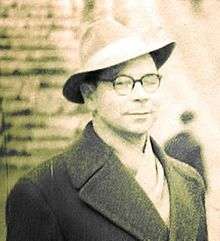Hamid Dizdar
| Hamid Dizdar | |
|---|---|
 | |
| Born |
22 February 1907 Stolac, Austria-Hungary |
| Died |
17 July 1967 (aged 60) Sarajevo, Yugoslavia |
| Occupation | Writer |
Hamid Dizdar (22 February 1907 – 17 July 1967) was a Bosnian writer and poet. He younger brother Mak Dizdar was also a prominent poet.
Hamid Dizdar was born to a Muslim Bosniak family in Stolac, Bosnia and Herzegovina.[1] He was the son of Muharem (died 1923) and Nezira (née Babović; 1881–1945).[2] Hamid was the oldest of three children. His younger brother Mehmedalija went on to become a celebrated poet, known by the name Mak Dizdar. Hamid's sister Refika (1921–1945) and mother Nezira were killed in the Jasenovac concentration camp.[3][4]
Dizdar worked as a clerk in his hometown Stolac before becoming an editor in Sarajevo for the newspapers "Slobodna riječ", "Jugoslavenska pošta", "Pravda", and "Gajret".[5] After the Second World War, Dizdar became the Director of the Archives of the City of Sarajevo. He edited the magazines "Odjek", "Vidik" and "Život". He began writing poetry while working as a social writer, and appeared in Knjiga drugova (Book of Comrades) in 1929.
Bibliography
- Arabeske
- Kasaba šapče
- Zapisi u kamenu
- Obasjane staze
- Niko se ne vraća
- Proljeće u Hercegovini
References
- ↑ Shatzmiller, Maya (2002). Islam and Bosnia: Conflict Resolution and Foreign Policy in Multi-Ethnic States. McGill-Queen's University Press. p. 35. ISBN 0-7735-2413-4.
- ↑ "Zašto se šuti o činjenici da su Srbi ubili 15.000 Jevreja". Diwan magazine. 26 May 2013. Retrieved 29 March 2015.
- ↑ "Mak Dizdar: The Poet". SpiritofBosnia. Retrieved 29 March 2015.
- ↑ "U II SVJETSKOM RATU NA MOSTU U BRČKOM, ALI I U JASENOVCU SU STRADALI I BOŠNJACI!". Otisak. 13 May 2013. Retrieved 29 March 2015.
- ↑ "Rođen Hamid Dizdar". Sutra. 22 February 2015. Retrieved 29 March 2015.